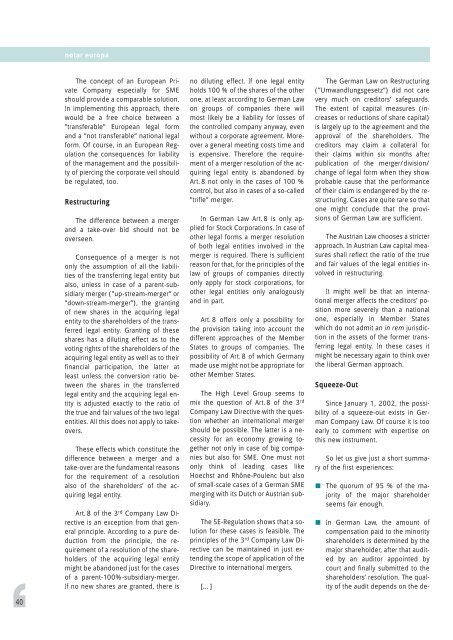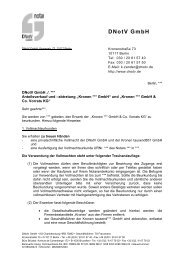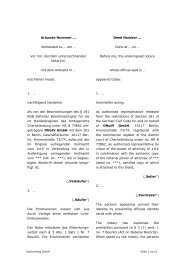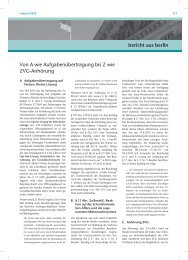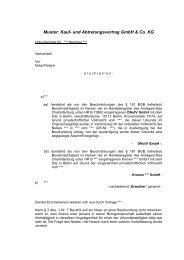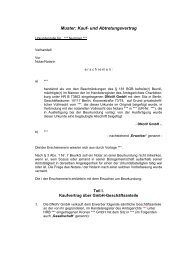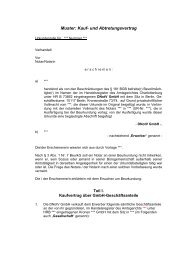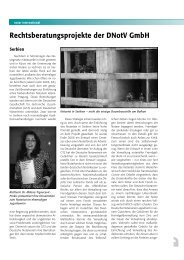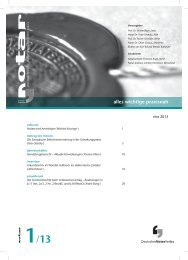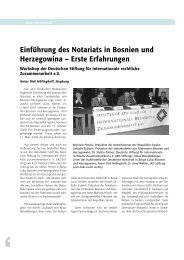notar Umbr_2.02 - Deutscher Notarverein
notar Umbr_2.02 - Deutscher Notarverein
notar Umbr_2.02 - Deutscher Notarverein
Sie wollen auch ein ePaper? Erhöhen Sie die Reichweite Ihrer Titel.
YUMPU macht aus Druck-PDFs automatisch weboptimierte ePaper, die Google liebt.
40<br />
<strong>notar</strong> europa<br />
The concept of an European Private<br />
Company especially for SME<br />
should provide a comparable solution.<br />
In implementing this approach, there<br />
would be a free choice between a<br />
”transferable” European legal form<br />
and a ”not transferable” national legal<br />
form. Of course, in an European Regulation<br />
the consequences for liability<br />
of the management and the possibility<br />
of piercing the corporate veil should<br />
be regulated, too.<br />
Restructuring<br />
The difference between a merger<br />
and a take-over bid should not be<br />
overseen.<br />
Consequence of a merger is not<br />
only the assumption of all the liabilities<br />
of the transferring legal entity but<br />
also, unless in case of a parent-subsidiary<br />
merger (”up-stream-merger” or<br />
”down-stream-merger”), the granting<br />
of new shares in the acquiring legal<br />
entity to the shareholders of the transferred<br />
legal entity. Granting of these<br />
shares has a diluting effect as to the<br />
voting rights of the shareholders of the<br />
acquiring legal entity as well as to their<br />
financial participation, the latter at<br />
least unless the conversion ratio between<br />
the shares in the transferred<br />
legal entity and the acquiring legal entity<br />
is adjusted exactly to the ratio of<br />
the true and fair values of the two legal<br />
entities. All this does not apply to takeovers.<br />
These effects which constitute the<br />
difference between a merger and a<br />
take-over are the fundamental reasons<br />
for the requirement of a resolution<br />
also of the shareholders’ of the acquiring<br />
legal entity.<br />
Art. 8 of the 3 rd Company Law Directive<br />
is an exception from that general<br />
principle. According to a pure deduction<br />
from the principle, the requirement<br />
of a resolution of the shareholders<br />
of the acquiring legal entity<br />
might be abandoned just for the cases<br />
of a parent-100%-subsidiary-merger.<br />
If no new shares are granted, there is<br />
no diluting effect. If one legal entity<br />
holds 100 % of the shares of the other<br />
one, at least according to German Law<br />
on groups of companies there will<br />
most likely be a liability for losses of<br />
the controlled company anyway, even<br />
without a corporate agreement. Moreover<br />
a general meeting costs time and<br />
is expensive. Therefore the requirement<br />
of a merger resolution of the acquiring<br />
legal entity is abandoned by<br />
Art. 8 not only in the cases of 100 %<br />
control, but also in cases of a so-called<br />
”trifle” merger.<br />
In German Law Art. 8 is only applied<br />
for Stock Corporations. In case of<br />
other legal forms a merger resolution<br />
of both legal entities involved in the<br />
merger is required. There is sufficient<br />
reason for that, for the principles of the<br />
law of groups of companies directly<br />
only apply for stock corporations, for<br />
other legal entities only analogously<br />
and in part.<br />
Art. 8 offers only a possibility for<br />
the provision taking into account the<br />
different approaches of the Member<br />
States to groups of companies. The<br />
possibility of Art. 8 of which Germany<br />
made use might not be appropriate for<br />
other Member States.<br />
The High Level Group seems to<br />
mix the question of Art. 8 of the 3 rd<br />
Company Law Directive with the question<br />
whether an international merger<br />
should be possible. The latter is a necessity<br />
for an economy growing together<br />
not only in case of big companies<br />
but also for SME. One must not<br />
only think of leading cases like<br />
Hoechst and Rhône-Poulenc but also<br />
of small-scale cases of a German SME<br />
merging with its Dutch or Austrian subsidiary.<br />
The SE-Regulation shows that a solution<br />
for these cases is feasible. The<br />
principles of the 3 rd Company Law Directive<br />
can be maintained in just extending<br />
the scope of application of the<br />
Directive to international mergers.<br />
[…]<br />
The German Law on Restructuring<br />
(”Umwandlungsgesetz”) did not care<br />
very much on creditors’ safeguards.<br />
The extent of capital measures (increases<br />
or reductions of share capital)<br />
is largely up to the agreement and the<br />
approval of the shareholders. The<br />
creditors may claim a collateral for<br />
their claims within six months after<br />
publication of the merger/division/<br />
change of legal form when they show<br />
probable cause that the performance<br />
of their claim is endangered by the restructuring.<br />
Cases are quite rare so that<br />
one might conclude that the provisions<br />
of German Law are sufficient.<br />
The Austrian Law chooses a stricter<br />
approach. In Austrian Law capital measures<br />
shall reflect the ratio of the true<br />
and fair values of the legal entities involved<br />
in restructuring.<br />
It might well be that an international<br />
merger affects the creditors’ position<br />
more severely than a national<br />
one, especially in Member States<br />
which do not admit an in rem jurisdiction<br />
in the assets of the former transferring<br />
legal entity. In these cases it<br />
might be necessary again to think over<br />
the liberal German approach.<br />
Squeeze-Out<br />
Since January 1, 2002, the possibility<br />
of a squeeze-out exists in German<br />
Company Law. Of course it is too<br />
early to comment with expertise on<br />
this new instrument.<br />
So let us give just a short summary<br />
of the first experiences:<br />
� The quorum of 95 % of the majority<br />
of the major shareholder<br />
seems fair enough.<br />
� In German Law, the amount of<br />
compensation paid to the minority<br />
shareholders is determined by the<br />
major shareholder, after that audited<br />
by an auditor appointed by<br />
court and finally submitted to the<br />
shareholders’ resolution. The quality<br />
of the audit depends on the de-


